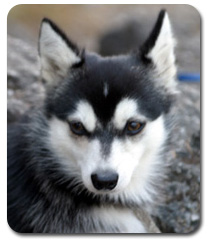
Alaskan Klee Kai
Origin: United States
Height:
– Toy: Up to and including 13 inches at the withers
– Miniature: Over 13 inches and up to 15 inches inclusive at the withers
– Standard: Over 15 inches up to and including 17 inches at the withers
Weight: Weight should be proportionate to height.
CLICK HERE to View Breeder Listings
Breed Profile
The Alaskan Klee Kai was developed in Alaska to be a companion-sized version of the Alaskan Husky. The breed was started by Mrs. Linda Spurlin during the early 1970s through carefully selected dogs who met her high standards for appearance and soundness. The breed was recognized by the United Kennel Club in January, 1997 and today, the Alaskan Klee Kai is still extremely rare.
The breed’s most distinctive characteristic is the facial mask which should be clearly visible. The Klee Kai is very curious, active, alert and agile. Despite his small size, he is an excellent watchdog due to his loyalty and affection for his family members and his reservation toward strangers and unfamiliar situations.
Health Issues
If you are considering the adoption of a Alaskan Klee Kay puppy, or any breed, it is very important to be selective in choosing a responsible and reputable breeder. Ensure that the prospective puppy’s parents have all health clearances. Breeding of any dog should not be done until after they have been proven to be free of evidence of significant hereditary diseases. (For more information on selecting a breeder, see the articles on the General Information page.)
Recommended Health Screening:
For the Alaskan Klee Kai, the CHICNote 1 database includes health screenings for the following:
- Autoimmune Thyroiditis;
- Patellar Luxation;
- Congenital Cardiac Database; and
- Eye Examination by board Ophthalmologist
- Factor VII Deficiency DNA Test is optional.
Additional Health Resources:
- Health and Nutrition — This section of the Canada’s Guide to Dogs website includes information on several health and nutrition related issues.
- Canine Health Information Center (CHIC) — Providing a source of health information for owners, breeders, and scientists that will assist in breeding healthy dogs. CHIC is a centralized canine health database jointly sponsored by the AKC/Canine Health Foundation (AKC/CHF) and the Orthopedic Foundation for Animals (OFA).
- AKC Canine Health Foundation — Working towards developing scientific advances in canine health.
- Orthopedic Foundation for Animals (OFA)
- Ontario Veterinary College (OVC)
- University of Pennsylvania Hip Improvement Program (PennHip)
- HealthGene — HealthGene Corporation is the leading provider of veterinary DNA diagnostic services in Canada.
- Labgenvet — Laboratory of Veterinary Genetics is a Canadian diagnostic laboratory that offers a comprehensive service of DNA tests for veterinary genetic diseases.
Breed Standards
Note: The Alaskan Klee Kai Association of America gained recognition for the breed with the United Kennel Club on January 1, 1997. The breed is not presently recognized by the Canadian Kennel Club (CKC) or the American Kennel Club (AKC). However, the breed may be recognized by other registries not indicated here.
Grooming Information
- Grooming — This section of the Canada’s Guide to Dogs website includes tips, articles and information covering all aspects of dog grooming along with a listing of Groomers from across Canada.
Training Resources
- Training — For training information, see this section of the Canada’s Guide to Dogs website for tips, articles, as well as listings of training centres across Canada.
Additional Information
- Clubs, Sports & Activities — For information on the many sports and activities you can get involved in with your dog.
- Working Dogs — The Working Dogs section of the Canada’s Guide to Dogs website provides information and listings of organizations that are involved in various dog jobs, such as Guide Dogs, Therapy Dogs, Police Dogs, Protection Dogs, and much more.
*NOTE 1: CHIC – The Canine Health Information Center “is a database of consolidated health screening results from multiple sources. Co-sponsored by the Orthopedic Foundation for Animals (OFA) and the American Kennel Club (AKC) Canine Health Foundation, CHIC works with parent clubs to identify health screening protocols appropriate for individual breeds. Dogs tested in accordance with the parent club established requirements, that have their results registered and made available in the public domain are issued CHIC numbers.” To learn more, visit: www.caninehealthinfo.org
Breed Listing
Quick Links
Get In Touch
- Email: canadasguidetodogs@gmail.com
- Email: info@canadasguidetodogs.com
- Visit us on Facebook: www.facebook.com/CanadasGuideToDogs
— CanadasGuideToDogs.com is an Amazon Associate as well as a participant in various affiliate programs, as such fees are earned from qualifying purchases.


